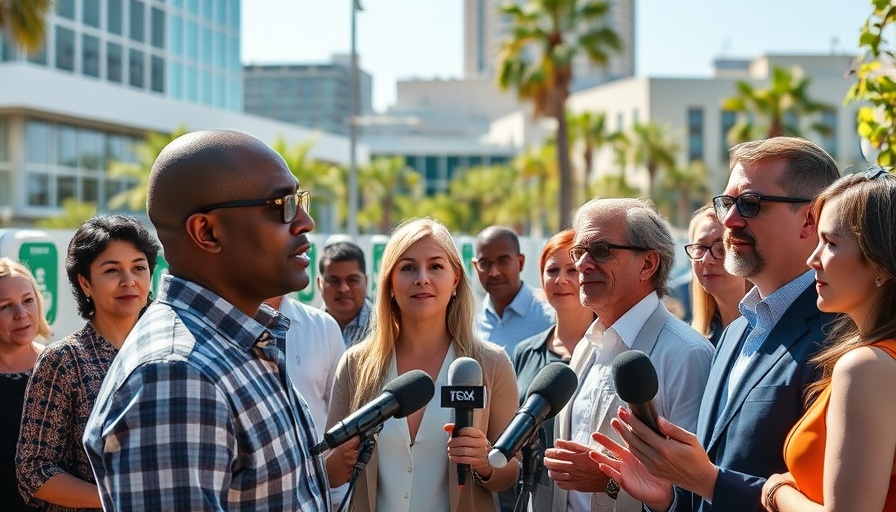
Understanding California's Innovative 'Feebate' Proposal
As California strives to increase the adoption of electric vehicles (EVs), the state is considering a unique approach to financing incentives for this shift—an initiative referred to as 'feebates.' This hybrid policy proposes that an extra fee is placed on the sale of gas-powered vehicles, while revenue generated would be redirected to subsidizing the purchase of electric cars. The idea is not only to bolster sustainable practices among drivers, but also to provide a financial incentive that encourages consumers to consider environmentally friendly options.
The Economic Efficiency of Feebates
Daniel Sperling, a key figure in transportation studies, argues that feebates could serve as an equitable solution for promoting cleaner car choices without straining California's budget. By shifting costs from purchase to ownership, this model reflects successful implementations found in countries such as Norway and the Netherlands, where environmentally motivated financial mechanisms have led to increased EV adoption. For instance, Norway's combination of incentives and fees has resulted in over 54% of new cars sold being electric as of 2022, demonstrating how effective such policies can be in shifting consumer behavior.
Immediate Impacts with Long-Term Goals
California's proposed plan could also help the state meet its climate goals more effectively—goals that have become increasingly urgent as federal incentives wane. As federal rebates are fading, the state’s move to establish a feebate system may be its best chance at maintaining momentum towards a greener transport sector. Additionally, Gov. Gavin Newsom's directive for public discourse around the feasibility and structure of such incentives highlights a proactive government approach. The Air Resources Board is actively seeking input from stakeholders, ensuring that the process remains transparent and inclusive.
Facing Resistance: Battling Industry Interests
However, the anticipated path to implementing these feebates is fraught with challenges. The automotive and petrochemical industries are expected to resist vehemently against such initiatives, concerned that added fees could deter consumers from purchasing traditional vehicles. Additionally, California's requirement for a two-thirds legislative vote on tax increases poses a considerable challenge. Industry lobbyists could mobilize to influence lawmakers, potentially stalling or derailing the implementation of feebates altogether.
What This Means for Californians
For everyday drivers in California, understanding this proposed feebate system is crucial. It’s a move that could benefit those looking to upgrade their personal vehicles while also contributing to environmental sustainability. With almost 150 electric models available in the state, many consumers will likely find viable options that align with their values and financial considerations. In this vein, accessibility to EV infrastructure is paramount. Cities like San Francisco have begun expanding charging networks to prepare for this shift, showcasing an effort to make electric driving more practical.
Global Lessons: Looking Beyond California
California isn't alone in its quest for cleaner transportation solutions. Other countries have successfully implemented financial mechanisms to promote EV adoption. Countries such as Sweden have demonstrated a commitment to sustainability by providing substantial tax incentives for electric car buyers and imposing fines on carbon-heavy vehicles. California’s leaders would do well to study these models in developing their own policy, contemplating both the successes and challenges faced elsewhere.
Future Predictions: A Greener Tomorrow?
As the debate over feebates heats up, one can anticipate possible ripple effects across the American automotive industry, potentially influencing businesses in states with similar climates or policies. A successful model in California could motivate other states to adopt similar measures, hastening the transition to electric vehicles nationwide. Moreover, the growing emphasis on ecological responsibility suggests this is just the beginning of a larger trend towards sustainable consumer practices distinct to our era.
Conclusion: A Call for Participation
As deliberations continue, Governor Newsom's call for public dialogue represents a genuine effort to gather a range of opinions and insights on this vital issue. These conversations will shape the future of transportation in California. Californians who recognize the importance of this issue should engage in public forums, voice preferences, and share ideas as policymakers contemplate implementing feebate systems that help electrify the state’s vehicle fleet. This is not just a change in transportation but a chance for each citizen to be a part of a necessary movement towards environmental responsibility.
 Add Row
Add Row  Add
Add 




Write A Comment